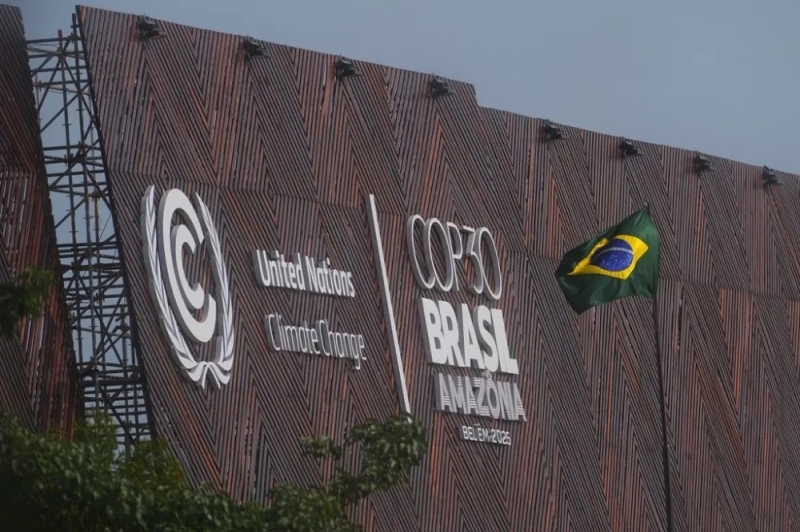- Tarique Rahman returns home amid rapturous reception |
- Home After 17 Years: Tarique Returns to Gulshan Residence |
- Tarique Calls for United Effort to Build a Safe Bangladesh |
- Tarique leaves for 300 feet area from airport |
- BNP top leaders welcome Tarique Rahman on homecoming |
AI debate heats up at COP30 climate talks

A Brazilian flag flies outside the venue for the COP30 U.N. Climate Summit, Thursday, Nov. 13, 2025, in Belem, Brazil. (AP Photo-Joshua A. Bickel)_11zon
Belem, Nov 18 (AP/UNB) — Artificial intelligence has become one of the most divisive topics at the U.N. climate talks in Brazil, with tech companies praising its potential to tackle global warming while climate groups warn that its growing energy use is adding new environmental risks.
At COP30, several countries and major firms highlighted how AI could improve electric grid efficiency, forecast weather for farmers, track deep-sea species and help design infrastructure able to withstand extreme climate impacts. They argue the technology can accelerate climate solutions at a critical moment.
Environmental advocates, however, say the rapid growth of AI — and the electricity and water demands of its data centers — could undermine global emission targets. “AI right now is a completely unregulated beast,” said Jean Su of the Center for Biological Diversity, warning that the world risks drifting further from the 2015 Paris Agreement goals.
Tech officials maintain that AI is already delivering climate benefits. Adam Elman, Google’s sustainability director, called AI “a real enabler,” while acknowledging the need for responsible use. Demand for AI tools has surged at the summit, with Michal Nachmany of Climate Policy Radar saying interest is “unbelievable” but accompanied by widespread concern.
AI’s prominence at COP30 marks a shift from previous summits. Nitin Arora of the U.N. Framework Convention on Climate Change said the body’s Global Innovation Hub, launched at COP26, has been flooded with AI-focused proposals. The Associated Press counted at least 24 AI-related events during the first week, ranging from tools to help cities exchange energy to forest crime prediction systems. The summit also presented its first AI for Climate Action Award to a project addressing water scarcity in Laos.
Delegates from several countries are testing AI systems to navigate the complexities of climate negotiations. German data scientist Johannes Jacob introduced an app prototype, NegotiateCOP, designed to help small delegations process hundreds of official documents and “level the playing field.”
Tech-sector representatives at COP30 insist AI can speed up solutions in energy and sustainability. Nvidia’s head of sustainability, Josh Parker, described AI as “the best resource any of us can have,” arguing that nearly every climate challenge could be solved faster with more intelligence. Leaders from Burkina Faso and the European Commission said AI is a powerful but risky tool that requires careful oversight.
The environmental impact of AI continues to fuel concerns. According to the International Energy Agency, data centers accounted for about 1.5% of global electricity consumption in 2024, with demand growing around 12% per year since 2017 — far outpacing overall electricity use. Su warned that water-intensive data centers in drought-prone regions and increasing emissions linked to AI operations could threaten national climate commitments.
Environmental groups at COP30 are pushing for regulations such as mandatory public-interest reviews for new data centers and requirements for full on-site renewable energy. “COP can’t treat AI as just a techno solution,” Su said. “It has to understand the deep climate consequences.” - UNB

